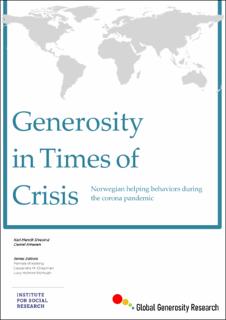Generosity in Times of Crisis. Norwegian helping behaviors during the corona pandemic
Research report
Published version
Permanent lenke
https://hdl.handle.net/11250/2839424Utgivelsesdato
2021Metadata
Vis full innførselSamlinger
- Publikasjoner fra CRIStin [715]
- Rapport/Avhandling ISF [367]
Sammendrag
The corona pandemic has thrown the world into a health crisis that has had devastating effects on the global economy and public life in many countries. Little is known about how people have responded to two competing pressures caused by the crisis in many countries: increased community need coupled with decreased financial capacity to help others. We surveyed 4,003 Norwegians between May and June 2020 to understand how their generosity behaviors manifested and changed during the corona pandemic. By generosity we mean all forms of behavior that people engage in with the intention of benefiting others (including people, animals, and environments). Two key findings emerged: 1. 28% of Norwegian adults contributed by engaging in one or more corona-related helping activities during four weeks of the first and second waves of the pandemic. 2. The key contributions that voluntary organisations made during the corona-crisis were provision of advice and information, as well as social and cultural activities. Managerial Implications. Voluntary organizations and nonprofit welfare providers may wish to: • Reach out with information about protective measures, testing, vaccines and how to get assistance to people in general and in particular to groups with special needs, including people with low skills in Norwegian language or that have little trust in government. • Organize social and cultural activities for people who are isolated or who have limited social networks, such as elderly, students or people with disabilities. Unmet mental and social needs can have long-term consequences. • Assist vulnerable groups, such as people without work or immigration documents, homeless and substance abusers, that the public sector may be less able to reach. Policy Implications. Governments may wish to: • Collaborate with voluntary organizations that can coordinate volunteers to distribute information, food and medicine. • Build up networks with organizations that can contribute to cover mental and social needs by organizing cultural or social activities and human contact. • Involve organizations to assist people that have low levels of trust in government or lack language skills, or who are excluded from social security benefits. This will help to avoid gaps in distribution of information and humanitarian aid
